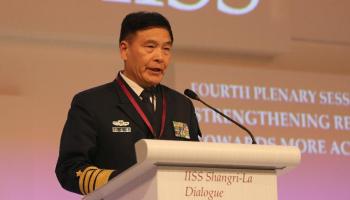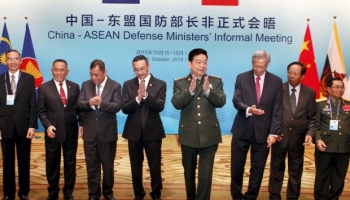http://www.xiangshanforum.cn/
https://youtu.be/jb3B6OHJBYg
https://youtu.be/_xpGrocWVWc
Major powers threaten other countries by seeking ‘absolute security’
 Professor Zheng Yongnian (right) speaks to reporters at the Xiangshan Forum in Beijing on Wednesday. Photo: Chen Ping/GT
Professor Zheng Yongnian (right) speaks to reporters at the Xiangshan Forum in Beijing on Wednesday. Photo: Chen Ping/GTThe US is sending the wrong diplomatic signals to South Asia, a Singapore-based scholar said at a security forum in Beijing on Wednesday. And he called for a balance in major power relations in the region.
Zheng Yongnian, professor and director of the East Asian Institute at the National University of Singapore, said "the US is adjusting itself toward the rise of China … But I don't think the US is sending the right signals to South Asian countries."
He noted, "although it will not go to war with China because of the Philippines [over South China Sea disputes] or any other nation, the signals the US sends out, including the Trans-Pacific Partnership or its 'Pivot to Asia,' are viewed negatively in South Asia."
Zheng made the remarks on the sidelines on the third day of the Seventh Xiangshan Forum. He dismissed the concept of absolute power in the globalization era.
"Major powers should understand that they pose a threat to other countries by seeking absolute security for themselves," Zheng said.
He emphasized that the expansion of NATO after the collapse of the Soviet Union led to conflict in eastern Ukraine, since the organization raised Russian security concerns.
Zheng also noted that as the world's major power, the US has to accept the natural rise of China. "China's economic rise means it will also have geopolitical influence regardless of the intentions of its leaders."
He lashed out at the notion of "alliances," which is an "offshoot" of the Cold War.
"Alliances mean there is an enemy. And no alliance is equal because there will be a leader and followers," he said, adding "the US, Japan and the Philippines remain in an alliance. I believe once Japan and the Philippines get a chance, they will seek an equal position."
However, smaller countries have to respect a major power's interests, otherwise it will cause regional conflict, like when South Korea agreed to deploy the Terminal High Altitude Area Defense (THAAD) system, he said.
The US anti-missile defense system has caused a rift between South Korea and China. Although some South Koreans have been raising health and environmental concerns, President Park Geun-hye defended it as a national defense necessity.
Separately, referring to the position of the US toward China, J. Stapleton Roy, former US ambassador to China, told the Global Times, "We would consider China hostile if it enjoys greater military might."
"Americans like to think in terms of using our robust military presence in the Asia-Pacific to balance the rise of China, but not to contain it, so that China's neighbors are not alarmed over its growing military and economic power."
China doesn't want to be a dominant power in the region, which is not a military showcase for the US as well, said Su Ge, president of the China Institute of International Studies.
"China is not intent on replacing the US," he said.
- Global Times - Asia-Pacific, Cross-Borders
US Policy towards China:
https://youtu.be/brUWyCi_x-4
Related posts:




No comments:
Post a Comment